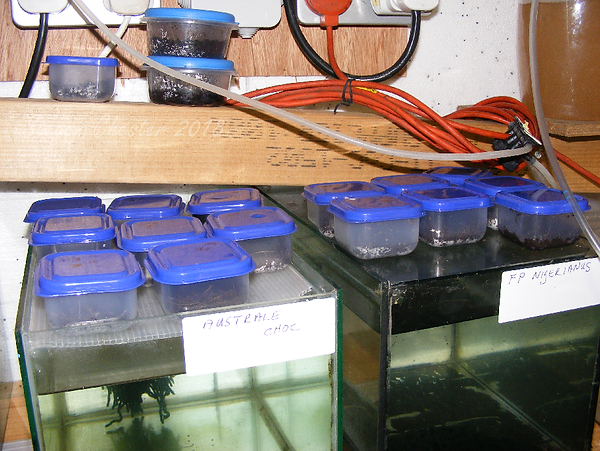
This was a second fishroom that Dave built, the first was to the left of the picture and was built as a room inside a metal garage, the first room was small (8x8 or 10x10 at a guess?) and this second room was much larger, the front window and door are part of a porch, designed to stop the cold British winter from chilling the fishroom when doors are opened! Dave also grew his Whiteworm cultures here where they received the perfect temperature!

Here is Dave feeding his breeding stock of Angelfish, Look at the size of some of them!! Dave never has any trouble growing fish on, his seem to grow twice as fast as anyone elses! He really should of shown his fish, he has a knack for a perfect specimen and the skills to grow them to a very good size! im sure he would be a winner on the show scene!

Here you can see the detail in the racking that Dave used in this fishroom construction, the tanks are mainly 18", 2ft and 3ft and all were stuffed with fry!

The right hand side held a few larger tanks (Far right of the picture), these measured 2ft front to back and gave a much larger surface area, i can remember Dave keeping populations of Apistogramma in these and leaving fry with the parents for a long time to simulate the natural reproduction strategies.

The fishroom was very well insulated! Polystyrene lined the walls, floor and ceiling and worked well to stop the warm air of the fishroom escaping.
Dave also installed double glazed windows into the roof to act as skylights and give some natural light, this was enough to work in during the day and then a 4ft T8 light unit and a normal bulb were set on timers for working in the evening. There was a gradual increase and decrease of light to prevent spooking the fish and to give them a dusk period.

Like most larger fishrooms in the UK (And other temperate countries) it is cheaper and more practical to heat the room rather than invest in individual heater stats and heat each tank seperately! Can you imagine how many plug sockets you would need to install!!!
A single 600w oil filled radiator and good insulation is a cost effective way of heating this fishroom.

A large piston type airpump supplied air to a pvc mainring and from there the tanks were supplied with air via individual valves.
I do not know if Dave is still using these pumps or not! Personally i am not a fan of this type of airpump, they are cheap and do produce a lot of air, however they are very loud, they vibrate a lot and you can see from the picture that Dave has sat his on a piece of foam and has some polystyrene between the pump and the wall.

The filtration was carried out with simple air powered sponge filters, these can be bought cheaply via the internet and are excellent for fishroom use. I can spot two Ancistrus in the photo!

This was handy, Dave drilled his tanks approx 3" from the base, installed a bent tank connector and added a valve with a quick release hose fitting, to drain his tanks he simple connected up a hose which went to waste, opened up the tap and drained to the required level.
If Dave is anything like i am, there will be times when he gets busy doing something else, the tank can never drain completely because it will always leave at least three inches of water in the bottom of the tank!

All good fishbreeders hatch Artemia! Dave is certainly no exception and most likely uses a lot more than some! he has plenty of mouths to feed!
It looks like Dave was using R/O type hose as a rigid air hose into the base of the hatchery, there are lots of methods to hatch and feed artemia, each fishroom i visit tends to do something slightly different.

Dave was good at breeding Killifish such as this Aphyiosemion sp.. My picture taking has gotten better over the years, many today i wouldnt chop the tail off!!

Dave was experimenting with storing non annual killifish eggs on damp coconut fibre, the advantage of this was that development would stall and he could hatch larger numbers of eggs in one go rather than the daily collecting and hatching method, his broods were more uniform in size which allowed all fish to grow together at a similar rate and to not have larger fish outcompeting the younger offspring which you would find if picking eggs daily and incubating them in water!

A lot of tubs = A LOT of eggs!!

Apistogramma offspring!

Apistogramma macmasteri 'Gold' a domestic form and they bred well for Dave, also look at that Java moss and Fern!! he has green fingers!

Stunning, Apistogramma cacatuoides male caring for his offspring which themselves must be 3-4 months old! Dave has a knack of growing fish well!

Some of his tanks were setup very naturally, with oak branches and lots of cover for shy species!

Beautiful blue ghost Angelfish. In 2010 these blue strain angelfish were a big hit and Dave was one of a very few people who managed to secure broodstock direct from Ken Kennedy in the Philippines.
Dave and i had many a hour discussing the finer points of Angelfish genetics and we learnt a lot from each other and from our research.

There were always a LOT of angelfish in this fishroom! having so many offspring allowed Dave to select the very best for his own breeding experients and i am always fascinated to visit with Dave and see his projects.
I hope you enjoyed this tour!